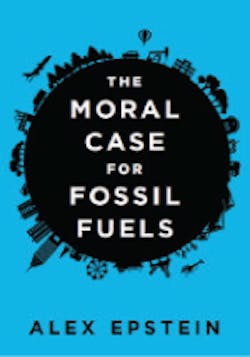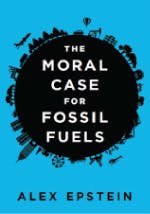Fossil fuels' moral case
Steven Poruban
Managing Editor-News
A book written by Center for Industrial Progress founder Alex Epstein takes a gutsy stance on a widely misunderstood and largely unpopular position. At just over 200 pages, The Moral Case for Fossil Fuels may not fully succeed in changing the minds of many outside of the oil and gas industry, but it might just aid in altering some negative thinking held by some of us within.
At this book's core, Epstein told OGJ, is this central message: "Fossil fuel use is not a dangerous addiction that is immoral to continue, but a healthy choice that humanity is morally obligated to increase." In other words, fossil fuels are a necessary good-something that we, as a society, should "embrace, champion, and further," he writes.
Epstein argues his case in nine chapters with titles like "The Secret History of Fossil Fuels," "The Greatest Energy Technology of All Time," and "The Energy Effect and Climate Mastery." Notably, the author devotes two entire chapters to fossil fuels' impact on climate-a difficult topic that Epstein himself admits took a while to reconcile in his own mind. It is this aspect of the moral argument that he says readers of this book will likely have the hardest time grasping.
"It's not the usual 'he said-she said' type arguments, where I quote my climate 'experts' of choice," he explains. "It's about how to think about and process expert opinion on the complex, interdisciplinary question of what impact fossil fuel use has on the livability of our climate and what that should mean for policy."
'Drastically undervalued'
Epstein says he started writing about fossil fuels out of pure fascination, and has spent the last 7 years developing the ideas for this particular book because he thought that culture "drastically undervalues" fossil fuels.
He says, "People find it odd that I, a kid from Chevy Chase, Md., who had a negative view of the industry growing up and no family, geographical, or financial attachment to it whatsoever, became such a champion of fossil fuels."
Epstein will probably face an uphill climb to peddle his moral message when the book is released next month. No stranger to controversy, he'll undoubtedly lean on some of his past experiences for guidance.
As examples, in his book he tells a story of how he paid $10,000 to publicly debate American environmentalist and author Bill McKibben, who has written extensively on the impact of global warming. Epstein also has stood in crowds of thousands of environmentalists holding a large "I Love Fossil Fuels" sign. And he's given numerous speeches on college campuses across America.
"I divide winning hearts and minds into three categories: neutralizing attackers, turning non-supporters into supporters, and turning supporters into champions," he explains.
Reframing the moral debate
The key to "winning hearts and minds" with this book, Epstein says, will be reframing the moral debate against fossil fuels.
"There is only one way to defeat the environmentalists' moral case against fossil fuels-refute its false central idea that fossil fuels destroy the planet," he writes. "If we don't refute that idea, we accept it, and if we accept that fossil fuels are destroying the planet, the only logical conclusion is to cease new development and slow down existing development as much as possible."
In this book, Epstein effectively argues to dispel several myths about the use of fossil fuels, including that they are dirty, unsustainable, and hurting the developing world.
"Fossil fuels are the key to improving the quality of life for billions of people in the developing world," he writes. "If we withhold them, access to clean water plummets, critical medical machines like incubators become impossible to operate, and life expectancy drops significantly."
He says, "If you commit yourself to looking at the 'big picture' evidence about what benefits human life, including our environment, it's just amazing how positive this form of energy is, and can be for a long time to come."

